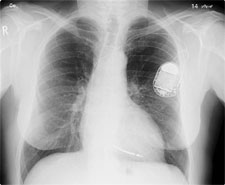 People suffering from irregular heartbeat rely upon a small device called the pacemaker. It sends small electrical signals and assists the natural electrical system of the heart in functioning properly. The device is placed in the chest or the abdomen by surgical procedure. Some of the risk factors associated with this surgery are swelling, bleeding, damage of the nerve or infection in the region of placement. But, can the artificial electrical pulses of this device cause cancer?
People suffering from irregular heartbeat rely upon a small device called the pacemaker. It sends small electrical signals and assists the natural electrical system of the heart in functioning properly. The device is placed in the chest or the abdomen by surgical procedure. Some of the risk factors associated with this surgery are swelling, bleeding, damage of the nerve or infection in the region of placement. But, can the artificial electrical pulses of this device cause cancer?
Do Pacemakers Cause Tumors
- Before we try to understand the possibilities of cancer from a pacemaker, it is important to know the basics of a tumor
- It is collection of rogue cells affecting a particular organ in the body. These rogue cells originate when external factors cause changes in the chemical structures of the genes. This process is technically called as the mutation
- The genes are formations inside a cell which instruct it to carry out its functions properly
- While a tumor is initially formed in a particular region of an organ, its cells quickly multiply in number and spread to the remote organs of the body through the blood stream. This process is called metastasis
- The factors responsible for the mutation are the exposure to certain harmful chemicals, pollution and radiations
- A pacemaker is placed to assist the organ heart in causing proper heartbeat. This in turn helps in pumping of oxygen rich blood all along the body
- Generally, cases of heart cancer are extremely rare. In most of the cases, the tumors of this organ are benign or non-cancerous in nature
- Moreover, unlike other cells of the body, heart cells are unique in nature
- They do not undergo death and division. In this way, the organ heart is naturally protected from the threat of developing the cancer ailment
- On the contrary, cancer cells are identified by their two characteristic features which are unregulated growth and no death
- Owing to the above mentioned reasons, there is hardly any evidence which suggests that the placement of the pacemaker device in the chest can lead to formation of tumor in the region
- The stable and static structure of the genes inside a heart cell reduce the possibility of any interaction to take place between it and the cancer causing carcinogens in the environment
- However, the best possible explanation on this topic can be provided by a registered and practicing cardiologist
- Placement of the device in patients is for a temporary period and while for the others it can be rather permanent
- In both the cases, the family members should visit the cardiologist and clear all the doubts and prejudices they have pertaining to the device
- It is a good idea to ask the doctor to explain the functioning of the device pacemaker, the organ heart in normal circumstances and the interaction between the device and the organ in a patient’s chest post surgery
- Claims made by the companies manufacturing the pacemakers should also be endorsed by the specialist in the meeting
- In this way, doubts of extreme risks associated with the pacemaker and its use can be removed
